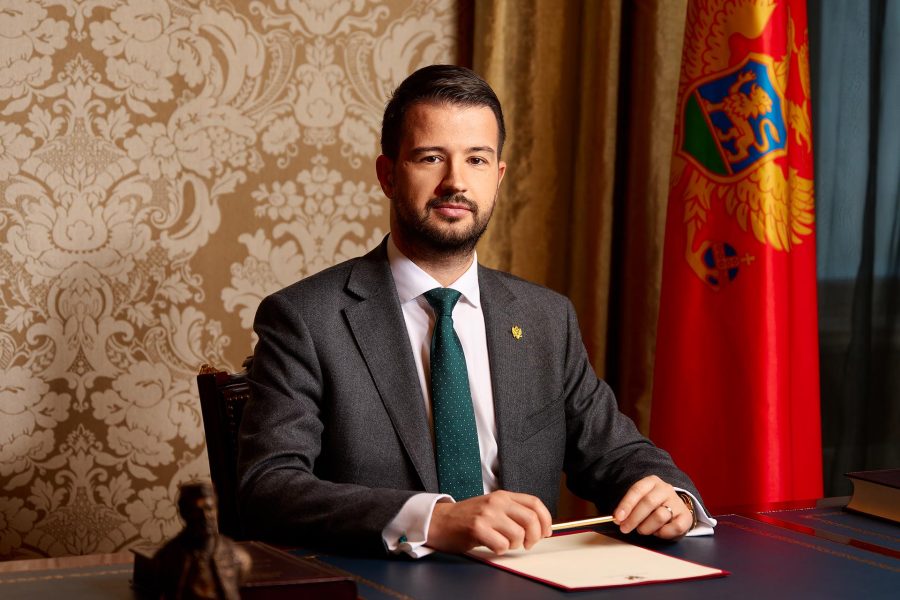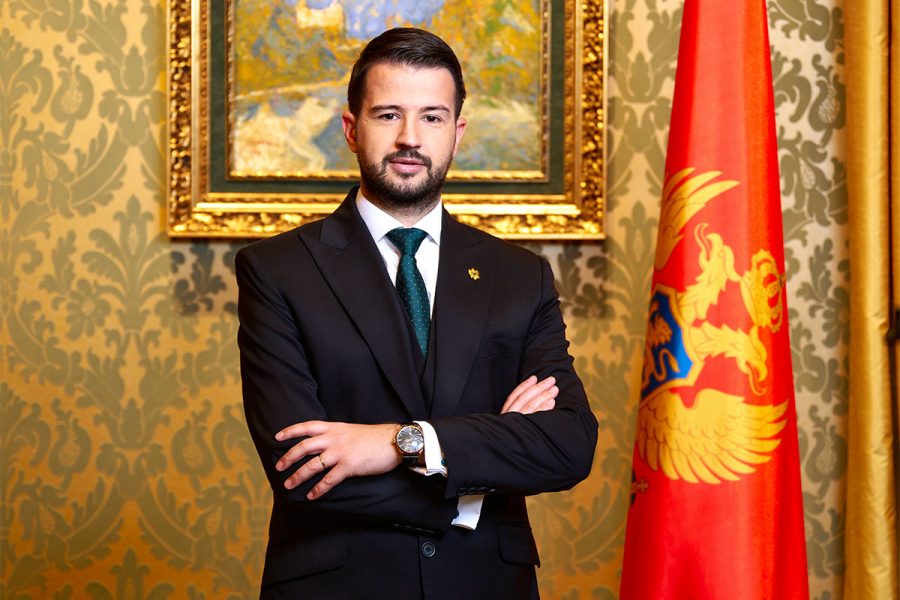I consider that we achieved a turnaround in economic and political relations between Montenegro and Serbia in the first year of my mandate, but also that Montenegro placed an additional focus on improving its good neighbourly relations with the other countries of the region ~ Jakov Milatović
The resetting of relations with Serbia, which President Milatović announced at the start of his mandate in Montenegro, received tangible parameters over the previous year. Speaking in this interview for CorD Magazine, he reminds us that – as a direct consequence of his initiative to transform bilateral relations – direct payment transactions have been established and discussions on infrastructure cooperation have been intensified, with a focus on completion of the highway and the renewal of the Belgrade-Bar railway. Mutual ambassadors also returned to Podgorica and Belgrade, thereby resolving a long-standing misunderstanding that also existed at that leve l , confirmsthe Montenegrin President.
When you took on the role of Montenegrin president a year ago, you decided that your first official visit would be to Serbia. How would you characterise relations between Podgorica and Belgrade today?
— My first official presidential visit, after visiting Brussels and EU institutions, was to Belgrade and had the aim of clearly sending a message about the normalisation of relations, including the restoring of diplomatic relations at the ambassadorial level.
I would remind your readers that, apart from the historically and traditionally close ties between Montenegro and Serbia, good neighbourly relations are particularly important from the perspective of European integration, given that the European Union itself emerged on foundations of regional economic cooperation.
Serbia is among our most important economic partners, so it’s noteworthy in that context that direct payment transactions between our countries were established soon after my visit. We thereby overcame one of the obstacles hindering the development of economic relations and created a tangible positive shift for businesspeople.
Montenegro is a leader in European integration and I often emphasise that I advocate for the regatta principle, i.e., for integration on the basis of the individual merits of each country and the meeting of membership criteria
Similarly, our discussions focused on infrastructure cooperation – on the completion of the highway and the revitalisation of the Belgrade-Bar railway, as well as the connecting of our countries in the energy field. In this sense, it is encouraging that our government has announced that, in partnership with European institutions, we will soon see the launch of construction of the second section of the Bar-Boljara highway, which will further improve Montenegro’s connections with Serbia, the region and the European Union.
Furthermore, I received the letter of accreditation of the newly appointed ambassador of Serbia in early February, while we’ve also initiated the process of appointing our ambassador in Belgrade. I’m certain that both appointments will contribute to strengthening bilateral relations between our countries.
Given all of the aforementioned, I consider that we achieved a turnaround in economic and political relations between Montenegro and Serbia in the first year of my mandate, but also that Montenegro placed an additional focus on improving its good neighbourly relations with the other countries of the region.
Despite supporting regional interconnectivity, Montenegro doesn’t participate intensively in all regional initiatives, such as the Open Balkan initiative. What do you consider as being the most useful measure when it comes to connecting the Western Balkan countries?
— Montenegro is a leader in European integration and I often emphasise that I advocate for the regatta principle, i.e., for integration on the basis of the individual merits of each country and the meeting of membership criteria. This sends a clear message that it pays off to be committed to reforms.
I will repeat that the European Union story emerged out of regional economic interconnection, which is why it isn’t an alternative to the EU, but rather a kind of preparation for the countries of the region to join the free European single market.

Supporting this claim, I recently signed decrees on the adoption of laws that confirm the so-called Berlin Agreements and represent part of the obligations emerging from the Berlin Process, and passing them will contribute to accelerating our country’s European journey, but also to improving regional cooperation.
Furthermore, Montenegrin citizens will be able to realise numerous benefits resulting from the implementation of these agreements.
You won Montenegro’s presidential election on a pro-European agenda. How do you view the pace of Montenegro’s European integration?
— I am certain that it’s possible to conclude all negotiation chapters by year’s end 2026 and to use 2027 for EU member states to ratify our accession, thus fulfilling our primary foreign policy objective of gaining full EU membership by 2028.
This view is today shared by the majority of our strategic partners. Representing a prerequisite for such a European integration dynamic is the implementing of reforms in key areas, first and foremost in the area of the judiciary, electoral system, economy, public administration and ecology.
I would remind you of the significant political transformation that occurred in Montenegro less than four years ago with the first democratic transition of power in the history of our country, and the process of democratising our society continued with the outcome of the spring 2023 presidential elections.
After demonstrating our democratic maturity in elections, a significant advance was achieved in terms of strengthening the rule of law and the independence of institutions by appointing new people to leading positions in the judiciary and the Central Bank, with broad political consensus in the Parliament.
EU accession is supported by more than 80 per cent of Montenegro’s citizens and we finally have the strong political will required to conclude the ten-year accession negotiation process. On the other hand, during my own intensive diplomatic activity since taking on the presidency, it has become evident that an equally strong will also exists in Brussels.
Also testifying to this claim are the facts that we are among the most economically advanced EU candidate countries, that we have been using the euro for more than two decades, that our foreign and security policy has been fully aligned with the EU for more than a decade, that we are a country that has no significant unresolved issues with our neighbours and promotes good neighbourly relations, and that we are a country that has opened all negotiation chapters with the EU and is a NATO member.
I believe that Montenegro’s EU accession would send a clear message that reforms pay off and that the enlargement process is still alive.
Will Montenegro or Ukraine become an EU member first? Do you agree with the view that the opening of the EU eastwards also represents good news for the Western Balkans?
— As I’ve said, Montenegro has a clear foreign policy objective: full membership in the EU by 2028. On the other hand, a complete Europe is a guarantee of the security, stability and competitiveness of the continent, which is why every advance of the candidate countries pleases us.
EU accession is supported by more than 80 per cent of Montenegro’s citizens and we finally have the strong political will required to conclude the ten-year accession negotiation process
We provide Ukraine with continuous support and assistance and, among other things, have received – compared to the size of our population – the most Ukrainian citizens among those who were forced to flee their country because of the war.
The eastward opening of the EU is, of course, good news for Montenegro and the entire Western Balkans, while it also represents a significant step towards ensuring the prosperity, peace and stability of Europe as a whole.
Where do you see Montenegro’s place in the EU’s Growth Plan for the Western Balkans and what are your key assets?
— We were able to hear projections at the EU-Western Balkans Summit, held late last year, that a common regional market for the Western Balkans could increase the GDP of our countries by ten per cent. As someone who spent many years working at international financial institutions and observed the EU integration of Balkan member states, I really believe in such an outcome.
The aim of regional cooperation is subsequent better integration with European markets, and the Growth Plan is important precisely in order to speed up those processes. That’s why this Plan is hugely significant for realising the economic potential of our region.
What we want from the Plan is for it to help us accelerate our socioeconomic convergence with the EU. We believe that we will succeed in this through the diversification of our economy and an ambitious plan for the development of our transport and energy infrastructure.

Our plan is to complete the highway through the north of the country that will connect us with Serbia and the markets of the region and Central Europe. We also want to build the Adriatic- Ionian highway, which will represent our bridge to Western Europe and will additionally connect us with our neighbours in Croatia, Bosnia & Herzegovina and Albania.
Moreover, we have already received significant funding to improve railway infrastructure in order for us to finally realise the massive potential of the Port of Bar and restore its strategic importance, and we expect additional funds to complete this project through the Growth Plan.
When it comes to energy, we expect the doubling of the submarine power cable connections between Montenegro and Italy, and for our country to become the energy hub of the Western Balkans. I’ve discussed this topic with our Italian partners, but also with European financial institutions, such as the EBRD and the EIB, which we expect to provide us with even greater support.
Following the initiative to replace the Speaker of the Montenegrin Assembly and your exit from the Europe Now Movement, predictions of possible early elections could be heard in Podgorica. How much basis is there for such speculation?
Our society has finally reached a national consensus over the accelerated European integration process, and thus the political leadership has an even greater responsibility to deliver planned results and remain consistent with a different political culture.
| CONNECTION Our plan is to complete the highway through the north of the country that will connect us with Serbia and the markets of the region and Central Europe | EU MEMBERSHIP Our primary foreign policy objective of gaining full EU membership by 2028 | REGIONAL COOPERATION The aim of regional cooperation is subsequent better integration with European markets, and the Growth Plan is important precisely in order to speed up those processes |
|---|